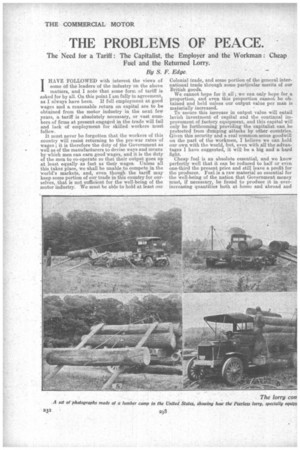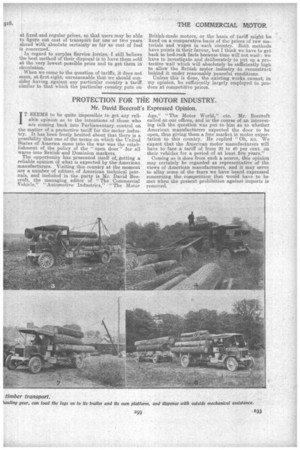THE PROBLEMS OF PEACE.
Page 12

Page 13

If you've noticed an error in this article please click here to report it so we can fix it.
The Need for a Tariff. The Capitalist, the Employer and the Workman : Cheap Fuel and the Returned Lorry.
By S. F. Edge -011.
/HAVE FOLLOWED with interest the views of some of the leaders of the industry on the above matters, and I note that some form of tariff is asked for by all. On this point I am fully in agreement, as I always have been. If full employment at good wages and a reasonable return on capital are to be obtained from the motor industry in the next few years, a tariff is absolutely necessary, or vast numbers -of firms at present engaged in the trade will fail and lack of employment for skilled workers must follow.
It must never he forgotten, that the workers of this country will resist returning to the pre-war rates of wages ; it is therefore the duty of the Government as
• well as of the manufacturers to devise ways and means by which men can earn good wages, and it is the duty of the men to co-operate so that their output goes up at least equally as fast as their wages. Unless all this takes place, we shall be unable to compete in the World's markets, and, even though the tariff may keep some portion of our trade in this country for ourselves, that is not sufficient for the well-being of the
industry. ndustry. We must be able to hold at least our Colonial trade, and some portion of the general international trade through some particular merits of our British goods. We cannot hope for it all ; we can only hope for a proportion„ and even this proportion cannot be obtained and held unless our output value per. man is materially increased. To secure this increase in output value will entail lavish investment of capital and the continual improvement of factory equipment, and this capital will only be forthcoming providing the capitalist can be protected from dumping attacks by other countries. Given this security and a real common-sense goodwill on the part of the workmen, I believe we can hold our own with the world, but, even with all the advantages I have suggested, it will be a big and a hard fight.
Cheap fuel is an absolute essential, and we know perfectly well that it can be reduced to half or even one-third the present price and still leave a profit for the producer. Fuel is a raw material so essential for the well-being of the nation that Government money must, if necessary, be found to produce it in everincreasing quantities both at home and abroad and at. fixed and regular prices, so that users may be able to figure out cost of transport for one or two years ahead with absolute certainty so far as cost of fuel is concerned.
In regard to surplus Service lorries, I still believe the best method of their disposal is to have them sold at the very lowest possible price and to get them in circulation.
When we come to the question of tariffs, it does not seem, at first sight, unreasonable that we should consider having against any particular country a tariff similar to that which the particular country puts on
British-made motors, or the basis of tariff might be fixed on a comparative basis of the prices of raw materials and wages in each country. Both methods have points in their favour, but I think we have to get back to bed-rock facts because time will not wait: we have to investigate and deliberately to put up a protective wall which will absolutely be sufficiently high to allow the British motor industry to reconstruct behind it under reasonably peaceful conditions.
Unless this is done, the existing works cannot, in my opinion, be sufficiently largely employed to produce at competitive prices.






















